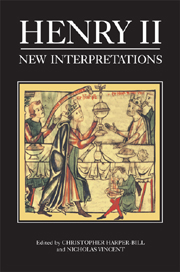Book contents
- Frontmatter
- Contents
- List of Illustrations
- Editor's Preface
- List of Abbreviations
- Introduction: Henry II and the Historians
- The Accession of Henry II
- Henry II and Louis VII
- Doing Homage to the King of France
- Henry, Duke of the Normans (1149/50–1189)
- Henry II and England's Insular Neighbours
- Henry II, the English Church and the Papacy, 1154–76
- On the Instruction of a Prince: The Upbringing of Henry, the Young King
- Henry II and the Creation of the English Common Law
- Finance and the Economy in the Reign of Henry II
- Henry II and the English Coinage
- The Court of Henry II
- Literary Culture at the Court of Henry II
- Henry II and Arthurian Legend
- Index
Finance and the Economy in the Reign of Henry II
Published online by Cambridge University Press: 12 September 2012
- Frontmatter
- Contents
- List of Illustrations
- Editor's Preface
- List of Abbreviations
- Introduction: Henry II and the Historians
- The Accession of Henry II
- Henry II and Louis VII
- Doing Homage to the King of France
- Henry, Duke of the Normans (1149/50–1189)
- Henry II and England's Insular Neighbours
- Henry II, the English Church and the Papacy, 1154–76
- On the Instruction of a Prince: The Upbringing of Henry, the Young King
- Henry II and the Creation of the English Common Law
- Finance and the Economy in the Reign of Henry II
- Henry II and the English Coinage
- The Court of Henry II
- Literary Culture at the Court of Henry II
- Henry II and Arthurian Legend
- Index
Summary
Introduction
Presenting an assessment of the finances of Henry II, linked to an examination of the English economy during his reign, would normally necessitate the construction of a series of comprehensive data tables for all component parts of royal revenue, in a similar manner to the ones I prepared for the reigns of his sons, Richard I and John. This work has shed new light on many of the controversial aspects of the period that encapsulated the loss of Normandy and the formulation of Magna Carta, and included the rapid inflation that gripped the English economy. In many ways, there was a compelling need to reassess the global and compositional totals for these monarchs; in terms of quantifiable data, nothing reliable had hitherto been provided in a systematic manner for the field of state finance, aside from calculations presented by Sir James Ramsay that have been constantly questioned by modern historians for their accuracy and therefore historical relevance. However, as part of his analysis of the revenues of the kings of England, Ramsay also produced data for Henry II's reign, and for reasons that are examined below, these figures stand up far more robustly to scrutiny, making the need for a similarly comprehensive review of global revenue totals somewhat superfluous for the purpose of this paper.
Consequently, I have decided to restrict this essay to an examination of some of the key areas of state finance during Henry II's reign, partly based on a reappraisal of Ramsay's existing global data, to see what patterns of activity emerge and whether there was any discernible relationship between Henry's financial policy and identifiable trends in the wider economy.
- Type
- Chapter
- Information
- Henry IINew Interpretations, pp. 242 - 256Publisher: Boydell & BrewerPrint publication year: 2007



